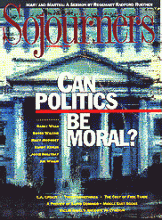Twentysomethings. The current shorthand for people in their 20s is especially fitting since it is a term derived from the title of the now-departed baby-boomer TV angst-fest, thirtysomething: People in their 20s are often defined almost solely in terms of the negative influence of television and unfavorable comparisons with baby-boomers.
In these scenarios, the generation of people currently in their 20s is portrayed as lacking ambition, moral depth, and interest in social activism. It's as though we were suckled en masse on The Brady Bunch reruns, weaned on MTV, and left with a universal case of cultural malnutrition--marked by short attention spans, materialism, and a generally shallow take on life. Somehow we never measure up to the '60s idealism of the early boomers or even the '80s career drive of the late boomers.
Twentysomething. Vague. Directionless. Insubstantial. Is this a full and accurate picture of a generation?
The funhouse mirrors (advertising, entertainment, media, information services) that reflect our image as a group or country too often stretch and distort out of the picture all elements that don't cluster around some (perhaps arbitrary) demographic center. Any attempt to define a generation is usually a middle-class and largely white affair. Minorities who aren't poverty-stricken and desperate are told they don't exist, as are the blue-collar and service-sector workers of all races. For that matter, the very wealthiest people who own a big chunk of the funhouse concession are invisible as well.
Read the Full Article

